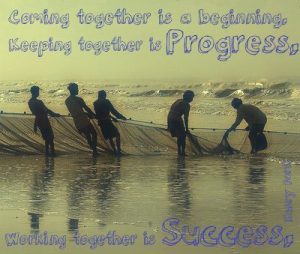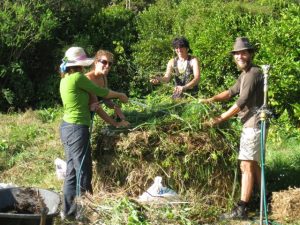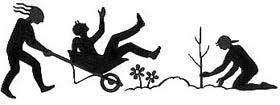Summary of Feedback about MBIE Discussion Document - November 21, 2018
Thank you for the responses to the discussion document about the NZ labour
inspectorate requirements regarding WWOOF volunteers. We received helpful emails with some
interesting feedback that we have passed onto MBIE. Some of the emails are below.
We also want to make it clear that the document was purely for discussion purpos es
es
and to get more ideas. It is based on what the government
requires. However we don’t want to go down the path of having to sign contracts with WWOOFers as that is not a great start
to welcome your guest. We have emailed MBIE, included host
feedback, and showed them how Australia, Canada and countries similar to New Zealand have progressively approached the
topic. Comment on the Australian Government website:
Voluntary work tourism schemes are a popular option in the
tourism industry in Australia. They offer visitors a valuable insight into Australia and meet the needs of a growing niche market in the tourism industry. Several organisations promote
opportunities for tourists to visit Australia to undertake
voluntary work activities in return for board, accommodation or reimbursement of basic
out-of-pocket expenses.
We are hoping we can come to some arrangement with MBIE that is satisfactory for both parties.
Feedback from Hosts regarding MBIE Discussion Document:
Feedback 1:
“WWOOFers are part of our lifestyle. They help us to grow and enjoy wonderful local
organic food. They do get a bed and are fed wonderful food which they help us to
grow. We make a small amount of money at the farmers market. WWOOFers come along to
the market, they help prepare the food the day before and sell at the market and the
WWOOFers LOVE it! They love the experience and learning of local food and farmers
markets. We don’t need the WWOOFers there. We take them along for the experience and
when there are no WWOOFers we do it on our own any way. It’s just like getting the
kids to help out. They are part of the family. I Have spoken to many WWOOFers who
don’t feel like they are exploited. They are there for the experience. They have
control as they can leave anytime if they are not happy.”
Feedback 2:
A different approach to the flow chart:
1. “Does the WWOOFer offer themselves willingly and without coercion to fill this role” (yes – flow on; no – employee)
2. “Does the WWOOFer feel that the standard of food and accommodation, together with the hosts relationship and experience gained was a fair reward for the efforts they gave” (yes – flow
on; no – employee OR review other WWOOFer experiences of this host)
3. “Did the WWOOFer feel in any way exploited by the relationship, did they feel obliged or
contracted to stay with the host for a defined period – which was longer than what they may
have chosen for the experience gained?
Does the wwoofer feel this role should be filled by an employee” (No – flow on; yes –
employment OR review other WWOOFer experiences of this host).
4. “Was the WWOOF role fairly advertised. Did the experience reflect the offers made by the
host?” (Yes – flow on; No review other WWOOFer experiences…work with host to better reflect
the experiences on offer)
5. “On average, do WWOOFers believe that the WWOOF experiences at any particular host site are “employment” or a great way to travel, share experiences, learn, experience, share cultures
and make new friends?”
Feedback 3:
“Our approach to WWOOFING is that we are offering, as far as possible, an immersive experience in living on, and producing food from, a small piece of landscape. But the key to it is participation. When we are sitting with WWOOFERS in front of the fire, drinking cider after a meal of paneer, pumpkin and parsnip curry with greens, talking about the day, the world, the ideas behind what we are doing etc; the experience is different if you have helped cut and stack the firewood for next winter, put out codlin moth traps and cleared weeds from under the apple trees
that produced the cide r, learned to identify the right kind
r, learned to identify the right kind
of taraxicum and plantain for the greens, helped with the
house cow and made the cheese. We are trying to give people
that experience, to understand what it takes in terms of
planning and thinking and understanding, and effort and
energy to put that food on the table, the cider in the glass
and the wood on the fire. To get that experience they need to grasp first what it takes to learn some new skills, to make
the effort, to realise that some tasks are not optional, that if we miss this or that deadline for raising seedlings or
pruning trees or picking fruit, that food is gone for a whole
year. So they need to understand that, although we will avoid it as much as
possible, sometimes you get wet and cold and your muscles get sore because, even
though you may buy your food already prepared in a pack, all of that work and
attention has gone into its production. Failure to understand that is a cornerstone
of our precarious economic and food production system and we are trying to change
that, at least at some level.
As well, especially for those for whom English is a second language, we offer an
immersion in colloquial English that even the best foreign speakers can benefit
from.
Yes, our WWOOFERS are guests, we have turned down several with dietary needs outside
our range who have offered to cook their own food because cooking and eating
together the food we produce is a key part of the experience, but we are very clear
that this is a participatory experience, you do not learn to swim or speak a
language just by watching and listening.
Wherever possible we try to have them complete a project while they
are here, it may be to learn how to trim a row of shelter trees, separate the
branches into mulchables and firewood, then cut and stack the firewood, in the
process also paying forward to other WWOOFERS who will benefit from the work, maybe
a year away.
They gain from the satisfaction of being able to see the effect they have had on the
landscape, of learning and applying new skills and taking ownership of a kind of
work they have not done before. Of course we benefit from their time with us, but we
also aim for them to take away a great deal more than just an exchange of effort for
bed and board.”
Feedback 4:
“If you provide board AND expect a certain amount of “work” from your WWOOFers
every day then these WWOOFers are employees. No matter if you are a private
household or a commercial operation.
As soon as the hosts expect the WWOOFer to help not only with certain tasks but also
for a certain time frame every day you have a potential problem on your hands.
This sums it up nicely;
“As they are guests, hosting WWOOFers is the same as inviting friends or family to
stay for an extended visit. Both parties are equal and autonomous, and there is no
expectation of quid pro quo, or an exchange of labour for board. These are given
freely as part of a cultural and educational experience, focused on small farm
lifestyles and organic farming.”
These were some responses we got and they are helpful to show MBIE more about
WWOOFing and what its all about. Hopefully we will hear from MBIE soon.
As always suggestions for making things better are welcome.
Andrew, Jane and Alannah
WWOOF We’re Welcome on Organic Farms


